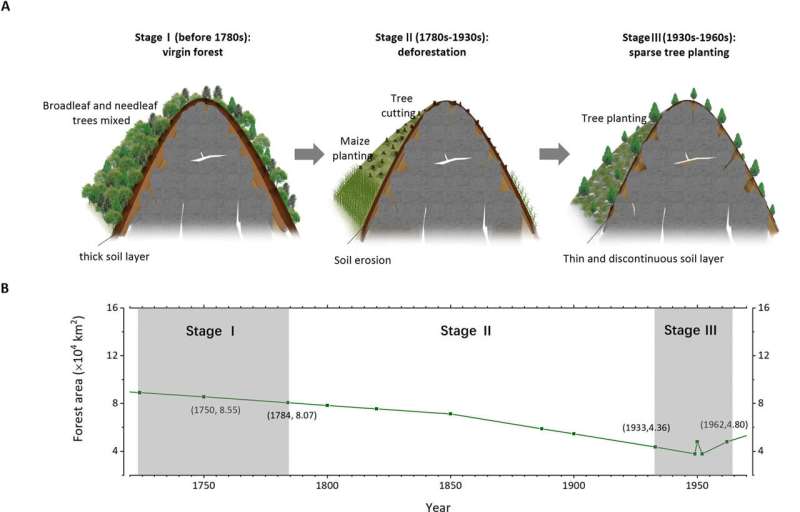This article has been reviewed according to Science X's editorial process and policies. Editors have highlighted the following attributes while ensuring the content's credibility:
fact-checked
peer-reviewed publication
trusted source
proofread
Maize cultivation 300 years ago resulted in karst rock desertification, suggest researchers

Understanding regional vegetation dynamics and historical changes in rocky desertification is crucial for assessing the sustainability and potential of afforestation in karst regions.
In a study published in Earth's Future on April 5, researchers led by Prof. Wang Kelin from the Institute of Subtropical Agriculture of the Chinese Academy of Sciences have found that maize cultivation and tree felling three hundred years ago triggered severe rocky desertification in the karst area of southwest China.
Scientists have developed a method to identify historical human disturbances using dating methods from karst depression sediments, including 137Cs, 210Pbex and charcoal 14C. The first-ever pollen record in karst depression sediments, combined with comprehensive dating methods and historical documents was presented.
According to the researchers, the forest evolution in southwest Guangxi is divided into three stages of "virgin forest-deforestation-sparse tree planting," over the past three centuries. It was probably a lush mixed deciduous and coniferous forest at the beginning. However, maize cultivation, along with explosive population growth and migration, accelerated mountain reclamation and deforestation, leading to severe rocky desertification around the 1780s. Since the 1930s, sparse afforestation has taken place, increasing economic benefits.
They conclude that the introduction of maize, population growth, and migration accelerated mountain reclamation and deforestation, leading to historical rocky desertification in the region, making it difficult for some karst areas to restore forest landscapes.
"Previous studies on historical rocky desertification and human activities in karst areas were mainly relied on historical literature records," said Prof. Yue Yuemin, corresponding author of the study.
"Our findings, for the first time, provide important scientific evidence and basis for establishing ecological restoration baselines and implementing precise afforestation and grassland restoration in karst areas."
More information: Yuemin Yue et al, Maize Cultivation Three Hundred Years Ago Triggered Severe Rocky Desertification in Southwest China, Earth's Future (2024). DOI: 10.1029/2023EF004349
Journal information: Earth's Future
Provided by Chinese Academy of Sciences




















